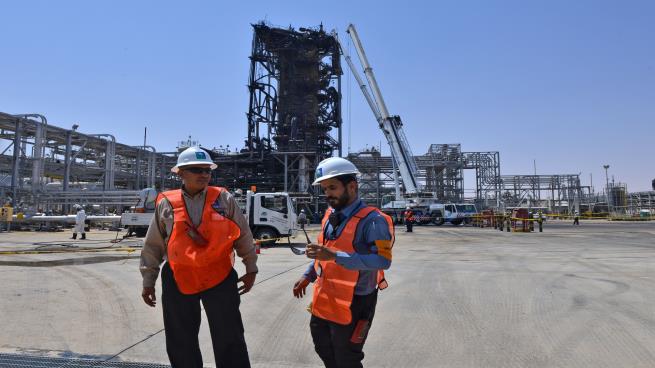
The losses of the Kingdom’s largest companies are escalating in light of a worsening economic crisis at a time when the shares of the state oil company Aramco, which is no longer attractive to investors, are falling.
The Saudi Steel Pipe Company (Saudi Pipe) recorded losses of 26.8 million riyals during the year 2019, compared to losses of 168.7 million riyals during the year before the previous decline, 84%.
The operating loss reached 35 million last year and losses of 51 million riyals during the year before last, a decrease of 31.5%.
While the total profit amounted to 13.2 million during the previous year, compared to losses of 2 million riyals during the year before the previous.
The loss per share in riyals reached 0.53 riyals during the past year, compared to losses of 3.34 riyals during the year before the previous.
Meanwhile, Aramco oil group has contributed most of the gains it made since it was listed on the local money market last December in a prominent IPO, with oil prices falling, amid growing concern about the new Corona virus.
Energy demand has declined in China, as the authorities prevented millions of people from leaving their homes to prevent the spread of the epidemic, with the emergence of great repercussions on the global economy dependent on the economy of the giant Asian country.
The decline, which has cut major oil contracts by up to 20 percent since the start of the panic caused by the spread of the virus, threatens to undermine Gulf economies that are already struggling to cope with falling prices and low demand for energy exports.
Among the most affected is currently Saudi Aramco, the largest oil company in the world, which was listed on the Saudi Stock Exchange amid great uproar on December 11 in a record first public offering.
The oil company raised $25.6 billion after selling 1.5 percent of its shares in a local subscription, with a third of the shares sold to five million Saudi citizens and promised 10 percent incentives if they did not sell their shares for six months.
The value of the public offering was increased to $29.4 billion in early January, when the company sold about 450 million additional shares to investors.
After a few days of trading, the share price rose by almost 19 percent, which raised the company’s valuation to over two trillion dollars, a figure that Saudi Crown Prince Mohammed bin Salman sought when he floated the idea of an IPO four years ago.
During the past weeks, the share price witnessed gradual but continuous declines, as it approached the IPO price of 32 riyals ($8.50) per share.
And the stock price closed last Sunday, at 32.80 riyals, which is the lowest price since listing on the stock exchange, which led to the decline in the company’s value to $1.75 trillion.
The world-class rating agency Standard & Poor’s said Monday that the Corona virus could further drop oil prices, especially if the disease that killed more than 1,800 people by March was not contained, as many hope.
The agency said in a report: “With regard to the Gulf countries, this may lead to a decrease in oil prices, economic growth and real estate prices, as well as a change in government spending, which may put pressure on the exporters we value in the region.” China is the largest importer of Saudi oil.
Aramco’s share price has fallen about 13.4 percent since it hit a record high of 38 riyals on December 16, and it has lost about seven percent since the start of the year, mostly after the outbreak of the Corona virus.
“Part of the initial decline came after the price rose to levels that made the stock unattractive to investors, and after traders sold to make a quick profit,” said Mohamed Zidan, market expert at Think Market in Dubai.
The company faces a major test in early April, when Saudi shareholders can sell their shares after collecting the 10 percent incentives.
Aramco has guaranteed to shareholders that it will distribute profits of at least $ 75 billion every year until 2024 as a way to attract investors.
The drop in the share price comes as the company prepares to announce its 2019 earnings on March 16.
In 2018, the company made a net profit of $111 billion, making it the most profitable company in the world. Nevertheless, its nine-month profit for 2019 decreased by 17.9 percent, mainly due to lower oil prices.